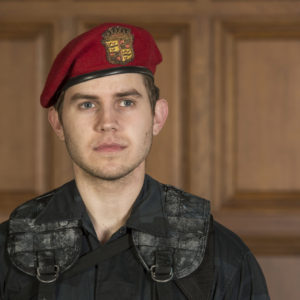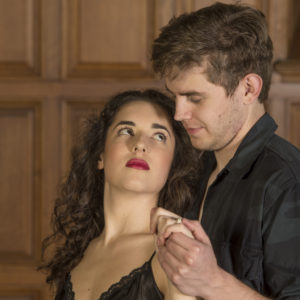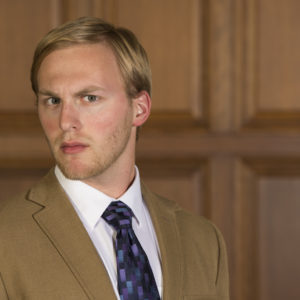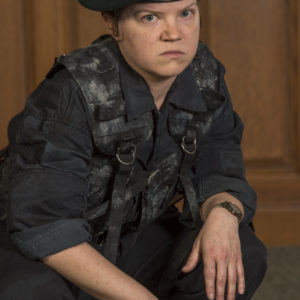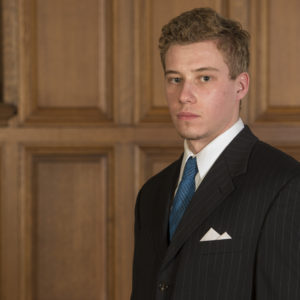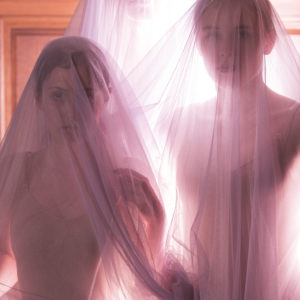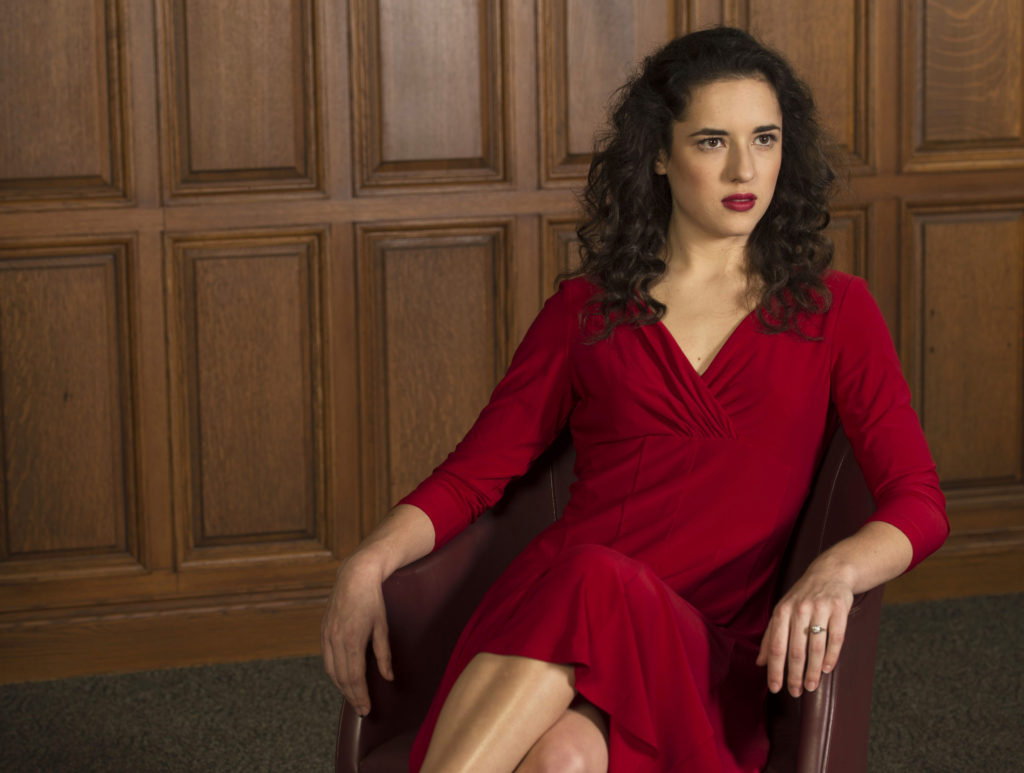
Fair is foul, and foul is fair:
Hover through the fog and filthy air
— From ‘Macbeth,’ Act I, Scene I
The war is won, the enemy vanquished, the victors basking in glory. And then it all goes wrong.
“For many years, I saw ‘Macbeth’ as a story of good and evil,” said Henry Schvey, professor of drama in the Performing Arts Department (PAD) in Arts & Sciences, who will direct the Shakespeare classic in Edison Theatre beginning Feb. 24.
But as he prepared for the production, amidst the turmoil of the 2016 presidential election, “the play began to strike me differently. It felt more ambiguous, less black-and-white.
“It seemed a story of moral corruption.”
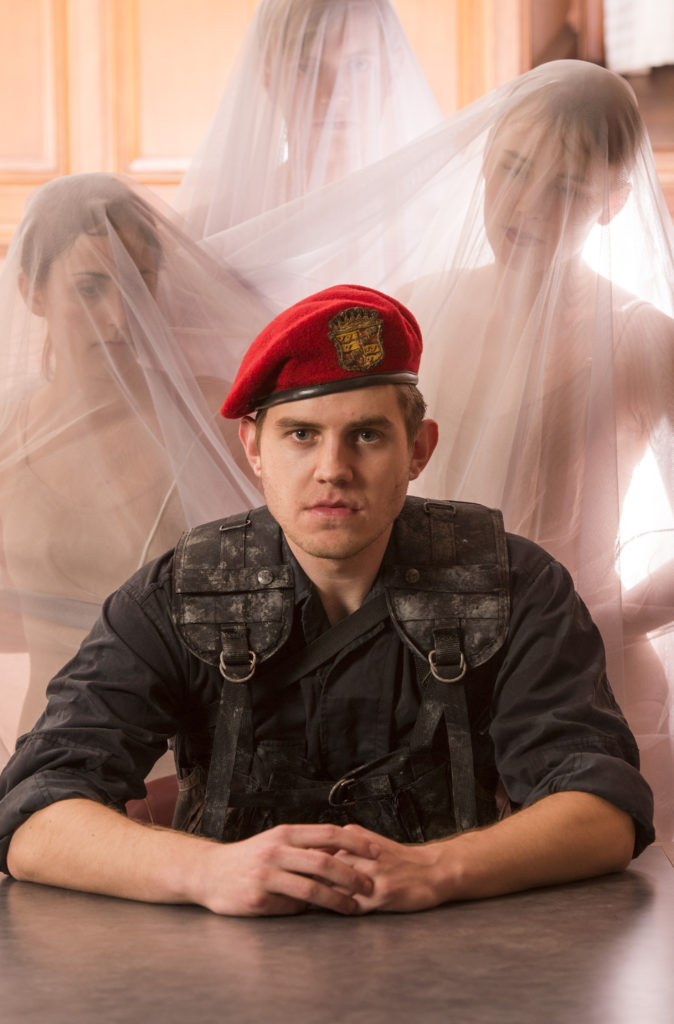
Sam Gaitsch. (Photo: Joe Angeles/Washington University)
Guilt and doubt
Traditional readings of “the Scottish play” emphasize the role of Lady Macbeth in pushing her husband to assassinate King Duncan. But to Schvey, who is setting the play in modern dress, this elides the complexity of both the characters and their marriage.
“The murder emanates from their relationship,” Schvey contended. “If you read the text closely, it’s clear that killing the king has been in their thoughts. Perhaps it was a plan, perhaps it was just an outlandish idea. But when she pushes him, it’s towards an agenda they’ve tacitly agreed upon.
“Macbeth is not a cardboard villain,” Schvey added. “He’s ambitious, a political force, but he’s also plagued by guilt and doubt. And his journey is deeply complicated. It’s not just about the rise and fall, the winning and losing. It’s about succumbing to temptation, and the deep futility he feels afterwards.”
At the same time, “Macbeth is operating in a world of flawed people. Macduff, who often is presented as a hero, takes flight, thus allowing Macbeth to butcher his family. Malcolm, Duncan’s heir, was born to royalty but not necessarily groomed to take the crown. Their shortcomings suggest a world in which there are no moral absolutes, powering Macbeth’s own ambitions.
“I think this aligns all too well with our current political moment,” Schvey said. “The world of moral ambiguity asserts itself in the play’s opening moments and never relinquishes its grip. It is a world of fog, in which the only certainty is that things are profoundly uncertain.
“For Shakespeare, whether or not Macbeth is a good ruler is almost beside the point,” Schvey added. “He’s more interested in the psychology of power. And at some level, I think Macbeth knows that, in killing Duncan, he’s killing the best part of himself.
“It’s a moral and spiritual suicide.”
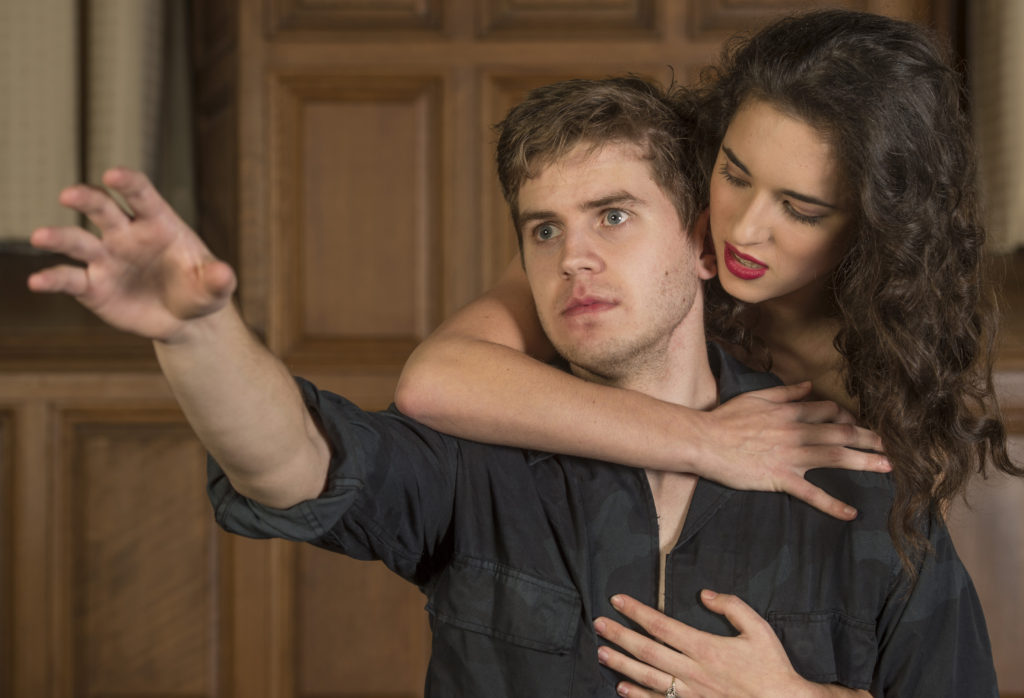
Cast & Crew
Schvey points out that “Macbeth” is the shortest of Shakespeare’s tragedies, and the only one lacking a major sub-plot. “It’s a relentless ride,” Schvey said, “but it also lends itself to intense intimacy.”
To capture that intimacy, senior lecturer Rob Morgan has designed an unusual set that will bring the audience — quite literally — onto the Edison stage. “In most modern productions, there’s a stark separation between actors and audience,” Schvey explained. “This will be closer to a shared life experience.”
The cast of 16 stars Josh Parrack as Macbeth and Caroline Sullivan as Lady Macbeth. Scott Greenberg and Juliette Hourani are Macduff and Lady Macduff. Danny Guttas is King Duncan and Michael Maley plays his son, Malcolm.
The three witches are played by Sam Gaitsch, Brandon Krisko and Hannah Marias. Taylor Jordan Brantley is Ross, Macbeth’s cousin. Leah Taylor is Banquo, Thane of Lochabar; Eric Judson is his son, Fleance. Megan Lafferty, Victor Mendez and Nathan Mester are the three murderers, hired by Macbeth to dispatch his rivals.
Costumes are by Teresa Doggett, with assistance from Sallie Durbin and Mona Jahani. Lighting and sound are by Dominick Ehling and Chisara Achilefu. Danny Washelesky is dramaturg and assistant director; Rob Henke provides dramaturgical assistance. Original music is composed by Henry Palkes and Pierce Constanti. Stage manager is Zach Hyams, with assistance from M.K. Mollman. Choreography is by Cecil Slaughter, with fight choreography by Erik Kuhn. Projections are by Sean Savoie.
Tickets
“Macbeth” begins at 8 p.m. Friday and Saturday, Feb. 24 and 25, and at 2 p.m. Sunday, Feb. 25. Performances continue the following weekend, at 8 p.m. Friday and Saturday, March 3 and 4;,and at 2 p.m. Sunday, March 5.
Performances take place in Edison Theatre, located in Mallinckrodt Center, 6465 Forsyth Blvd. Tickets are $20, or $15 for students, seniors and Washington University faculty and staff, and $10 for WashU students. Tickets are available through the Edison Theatre Box Office.
For more information, call (314) 935-6543.
